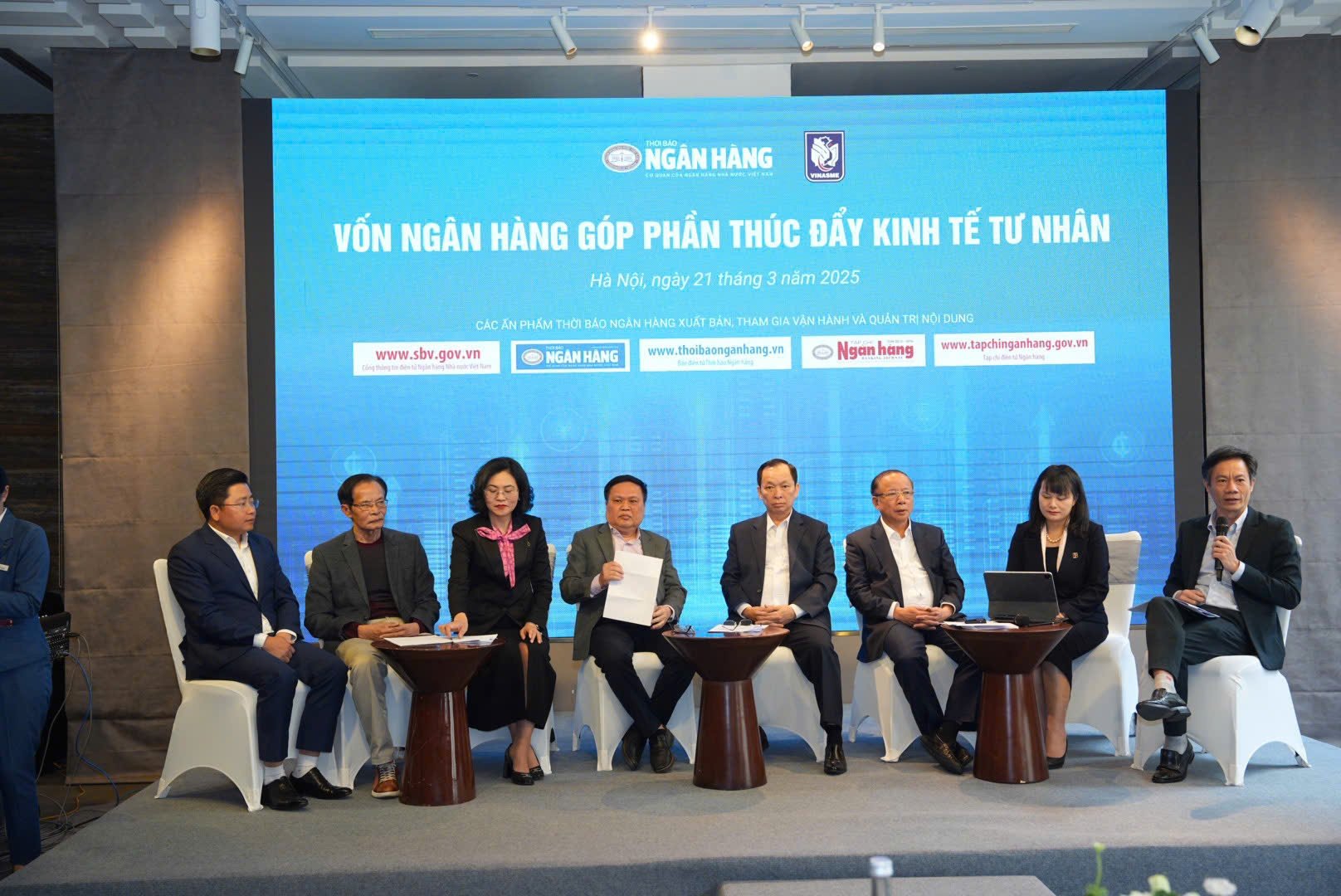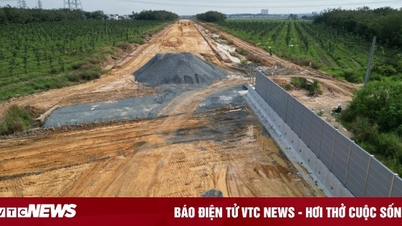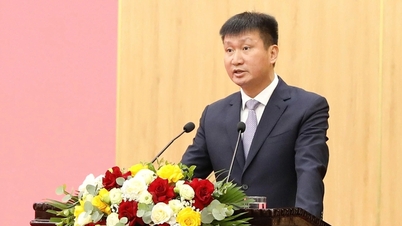 |
Drivers of economic growth
Over the past four decades, the private economic sector in Vietnam has witnessed strong growth, becoming an important pillar of the economy. According to data from the General Statistics Office ( Ministry of Finance ), this sector currently contributes about 50% - 60% of the country's GDP, creating jobs for 85% of the workforce... This affirms the irreplaceable role of the private economy in economic growth, improving the quality of life and contributing to sustainable development.
The private economy today is not only significant in promoting GDP growth but also plays an important role in transforming the economic model. If this sector does not develop strongly, does not accept technology and innovation, the Vietnamese economy will hardly achieve high and sustainable growth in the future.
One of the most important contributions of the private sector to the economy is its ability to boost aggregate demand through investment, consumption and import and export. This sector currently accounts for nearly 30% of total export turnover and contributes 56% of total social investment capital, much higher than the state sector (28%) and the foreign-invested sector (16%).
This difference shows the great potential of the private economy in expanding investment. If private investment increases by 1%, the absolute value will be equivalent to a 2.5% increase in public investment and a 3.5% increase in foreign investment. This further confirms that the private sector is the main driving force for overall economic growth.
Unlike public investment which is limited by the public debt ceiling or pressure from the state budget, private investment has the potential to expand more strongly. With abundant financial resources being held in many forms such as gold, foreign currency, land, savings in banks, unblocking this capital flow will create a great driving force for economic growth and the transition to a more sustainable development model.
According to Dr. Le Duy Binh, the private sector not only plays an important role in economic development but also contributes greatly to social security. Currently, this sector creates jobs and livelihoods for more than 80% of the workforce, helping millions of workers shift from low-income jobs in agriculture to higher-productivity industries. The average income of a worker in a private enterprise is three times higher than that of an ordinary farmer.
In addition, private enterprises also contribute to expanding the scope of social insurance and welfare programs. Thanks to the increase in the number of workers in this sector, the number of social insurance participants has increased from 9.2 million in 2010 to about 17.5 million in 2023. By 2025, this sector will play a key role in achieving the target of 45% of the workforce participating in social insurance and 60% in 2030.
This shows that the private economy not only generates income but also helps improve the quality of life of workers, contributing to the development and progress of society. It is also an important factor in perfecting the socialist-oriented market economy of Vietnam.
Transforming the model and improving growth quality
During the renovation process, Vietnam has taken advantage of cheap labor, natural resources and geographical location to attract foreign investment. However, this model is gradually revealing its limitations. Dr. Le Duy Binh believes that to move towards a more productive economy, Vietnam needs to rely more on innovation, technology and improving the quality of labor - and the private economy is the important force and factor to do that.
Currently, the state-owned enterprise sector, although holding large capital resources, has not yet used them effectively. Private enterprises, especially small and medium-sized enterprises, although having strong development potential, still face many barriers in terms of business environment, access to capital and support policies.
A major problem in the private sector is the imbalance in the structure of enterprises. Of the 940,000 operating enterprises, 97% are small and micro enterprises, with only 1.5% being medium-sized enterprises and 1.5% being large enterprises. The absence of medium-sized enterprises is a major obstacle to the sustainable development of the economy. These enterprises are an important bridge between small and large enterprises, helping to create linkages in the value chain and improve the competitiveness of the economy.
In addition, the majority of the private economy in Vietnam is still in the informal sector with more than 5 million individual business households. These business households contribute significantly to GDP but do not have a clear legal status, causing many difficulties in accessing credit and long-term development.
Breakthrough policies are needed to make the private economy a growth driver.
In order for the private economy to truly become the main driving force of the economy, Dr. Le Duy Binh emphasized the need for breakthrough policies to unleash resources, create a favorable business environment and promote entrepreneurial spirit.
In particular, policies are needed to foster the entrepreneurial spirit, so that the freedom of business is further strengthened and businesses are truly allowed to do what the law does not prohibit. These policies will create a foundation for the property rights and freedom of business of the people and businesses to continue to be affirmed. The management method of the management agency is based more on market principles and tools than on administrative decisions.
Policies for the private economic sector need to provide guidance so that the legal system is built in a way that not only serves the management goals of state agencies, but also plays a creative role in unlocking resources, building a favorable, safe, low-cost business environment that approaches international standards.
The legal system must skillfully use market tools and mechanisms to mobilize and allocate resources, and unleash resources to serve economic and social development. The legal system will encourage businesses to promote research and development (R&D), invest in science and technology, and apply innovation.
These decisions will be the foundation for the rapid introduction and application of regulatory sandboxes, policies for innovative enterprises, as well as measures to support the absorption and transfer of technology from abroad. The legal system needs to encourage the spirit of venture capital, dare to accept risks and form an ecosystem to support venture capital projects and business ideas of enterprises, whether large or small.
Along with that, the legal system also needs to be reformed in the direction of simplifying administrative procedures, minimizing legal compliance costs, and minimizing legal risks for businesses. At the same time, organizations and institutions operating the policy enforcement apparatus will also be reformed. The process of streamlining the state administrative apparatus, improving the effectiveness and efficiency of public agencies will be promoted so that the state apparatus will be organized in the direction of serving businesses and people, instead of simply playing the role of administrative management. This requires a shift from management thinking to development thinking, demonstrated through improving the quality of public services, speeding up the processing of administrative procedures, and enhancing transparency in the decision-making process.
“Such decisions will help businesses feel that they are operating in a safe environment, protected by law and tolerated when they fail, and when they fail they have the opportunity to try again. Thanks to that, businesses will be excited and enthusiastic in production and business, enthusiastic about venture capital, investment in research and development activities, innovation, new ideas and business models,” Dr. Le Duy Binh emphasized.
According to this expert, this will help further promote the entrepreneurial spirit, more strongly protect entrepreneurs and businesses when they implement business ideas that are unprecedented but not prohibited by law, thereby promoting the spirit of daring to accept risks, venture investment, investment in innovation through more controlled testing mechanisms in many legal documents.
Such policies also affirm and strengthen the role of the domestic private economy as the main pillar and main driving force of the economy, especially in the effort to achieve high growth rates and for the economy to strongly and firmly shift to a high-income economy, based on innovation, creativity, labor productivity, high added value and high knowledge content.
“Considering the private economy as the main pillar and the most important driving force also contributes to enhancing endogenous capacity and consolidating the self-reliance of the economy. The ambition of a prosperous, prosperous, powerful and economically autonomous Vietnam will also be closer, more feasible and easier to realize with the cooperation of the people and the domestic private economic sector,” Dr. Le Duy Binh concluded.































































































![Dong Nai OCOP transition: [Article 3] Linking tourism with OCOP product consumption](https://vphoto.vietnam.vn/thumb/402x226/vietnam/resource/IMAGE/2025/11/10/1762739199309_1324-2740-7_n-162543_981.jpeg)








Comment (0)